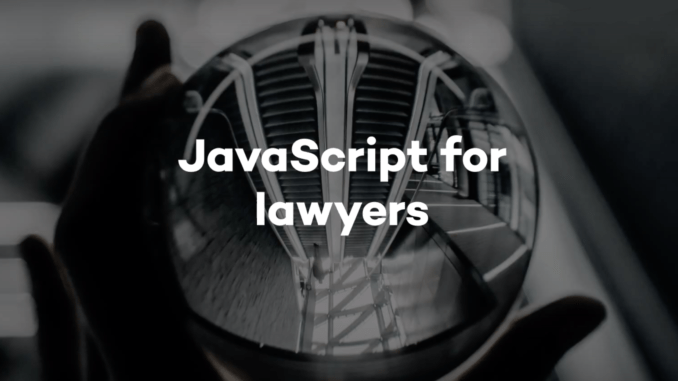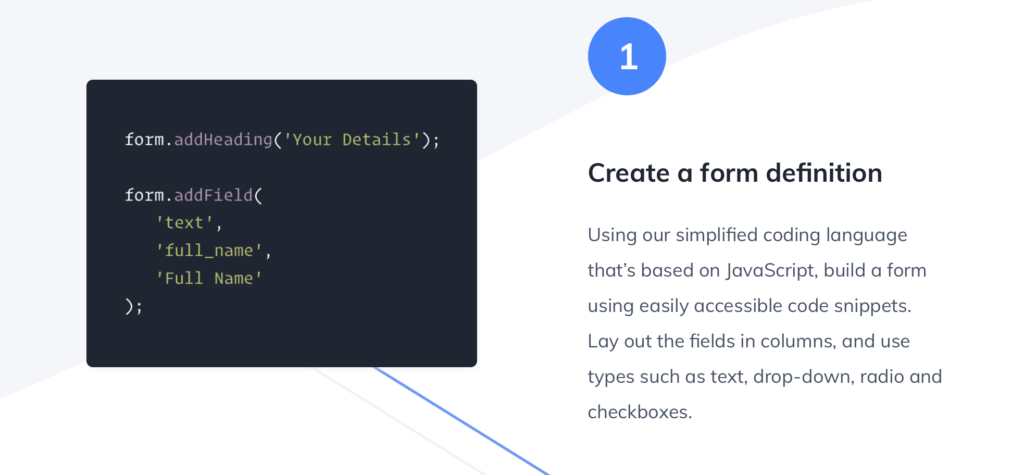
Should lawyers learn to code? The question that has launched a thousand conversations at legal tech events, with the answer usually being: no. But, maybe something has changed now with the arrival of a more focused approach and some real use cases for those potential coding skills.
—
And here’s a short video on how the system works.
–
[ * ‘coding’ – the term itself is used very broadly in the legal world. Do we mean setting up very basic commands in contract automation systems, of which there are now many on the market? Do we mean creating the interface for an automated template, as in this case with a modified version of JavaScript? Do we mean the coding of computable self-executing clauses in smart contracts using systems such as the software provided by the Accord Project, such as Ergo and Cicero, and the software provided by other smart contract platforms? Or do we mean full-on software creation where someone is designing and building an entire application in code, as opposed to very small segments of it?
The reality is that with the general way we talk about ‘coding’, the term refers to all of the above. It’s become a kind of shorthand to mean ‘anything that is not natural language’. It feels like we may need to differentiate things now, especially given the proliferation in ‘coding’ models and approaches, from very basic, to super complex. For now, it looks like we are stuck with the umbrella term, but AL would be interested to hear if anyone has a user-friendly taxonomy that can divide up the various uses. ]

Over 20 years ago I used Microsoft Word to automate processes.
It did not have the bells and whistles of commercial products but addressed only the current needs of the service.
Colleagues learnt to love tech.
Hello Richard,
With Juridoc (coming in the next few days), lawyers will not have to learn how to code at all to automate documents. And it will not take hours but minutes to do it in our platform. Stay tuned ! 🙂
I think the question isn’t so much whether lawyers HAVE to code, but whether they get a chance to do so. It’s 2019, we all live with technology, we love it, and it’s here to stay. Coding isn’t the scary beast it once was. It’s empowering and it’s fun – like driving a car or riding an escooter.
I agree with Maxime. The coding can be automated for both new templates and legacy documents. My company works with Legal AI engines, feeding them native Microsoft Word documents. Our first contract came to us quite by accident, because the existing PDF-OCR method of converting these complex documents to AI ready text was fraught with errors. And we do excellent PDF, even for the most complex and lengthy documents.
The thing is, once we understood the Legal AI problem with complex MS Word documents, we knew the most accurate route was to separate document content from styles, vector label the content text creating “ranges”, feed this into the AI engine, and then merge the results back into the original native document. All in real time.
Since our core competency is that of browser-based viewing and collaborative editing of complex native MS Word documents, the AI engine can be treated as just another collaboration member; able to highlight, edit and comment.
From a document perspective, the Legal AI industry looks to have three generations, and we are ready to work on the third level.
For argument’s sake, we reference the three generations as:
I. Static Reports based on PDF-OCR reading of complex native documents
II. Real-time direct interaction “inside the document”, where the AI engine is editing and commenting while collaborating with lawyers and legal teams.
III. Blockchain Smart Contracts and Documents
Since we have “programmatic” control over all documents fed into the AI engine, we can insert blockchain code. What we need is to have the AI engine trained to identify the actionable components of a contract; the tags and triggers needed to initiate a new block. The AI engine passes the tags to our software as part of the collaborative editing process.
Etherium has automated the process of initiating a blockchain / new blocks, using a simple scripting language called “Solidity”. It’s very JavaScripty looking 🙂 But perfect for automating this process at the application level.
There are some questions about performance with Etherium Blockchains, but the idea is extraordinary. Technically, it’s possible to set up Etherium inspired blockchains within lightning fast Cloud centers from an Amazon or Google type player.
The other thing I would like to point out is that this process is designed to deal with the billions of legacy native MS Word documents. They don’t have to be recreated. Just pushed into a whole new direction, while still continuing to service the legacy workflow they fuel.
This document-centric perspective applies to Legal AI in one other way. As a platform, the great promise of the Internet has long been the integration of “communications, computation, and collaboration”.
When you look into the components of that string, you will realize that for business, “computation” includes Data and Documents. The information that fuels every business is captured as data, documents, and collaborative-communicative methods.
For an AI machine to be put to maximum use, it needs access to data, documents, and methods. Data is easy to manipulate, move and share. And it has long been the case that many applications are able to operate on the same data sets. (Not good news for Oracles Cloud Computing future).
This is not the case with documents! All advanced and typographically rich productivity documents are “application specific”. They are locked into the application that created them. In most cases, MS Word.
The documents are also rich with both data, human assessment, and knowledge. They are the corporate jewels. Especially if we are able to capture the human methods and collaborative interaction surrounding documents.
We now know how to unlock these documents and feed this rich information set to AI engines. We also know how to enable an AI engine to interact within the document, and in direct collaboration with humans. It’s like having a legal spellchecker kind of nanny, watching and helping humans make decisions. Note that the AI engine will have a front row seat to learn from human methods.
I have no idea how this will impact the Legal industry. My guess is that the engines get very smart feasting on all three information components: data, documents, and methods. And, I think the AI engines are going to fully control blockchain smart documents.
Wow, what a world we live in!
~ge~
Gary I suggest that you try to dumb down your comments so that it makes sense and is readable by the average lawyer (I assumed that was the target audience). No doubt your post was full of great insights but it was lost on this simple lawyer.
Thanks Rob. You have identified that it is difficult for technology obsessed people to communicate. You perhaps have also answered the question at hand. My job in technology is to greatly multiply your expertise and efforts as a lawyer. Not through dialog. That is an integral part of your bailiwick. But through code. Software code.
Great read thanks for posting!